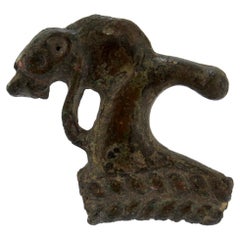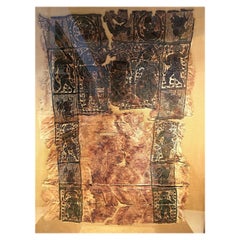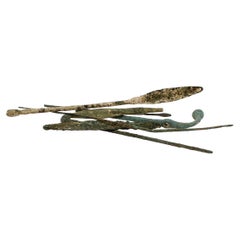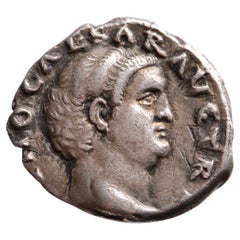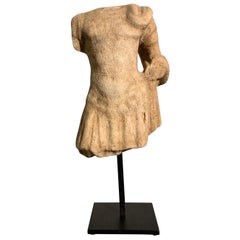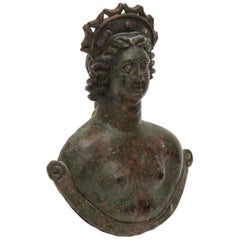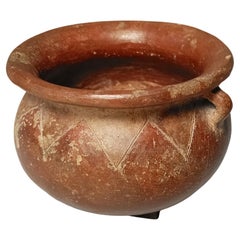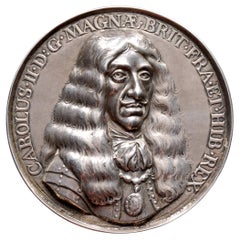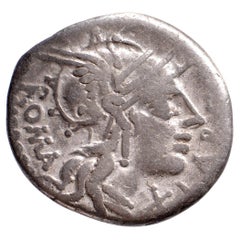Classical Roman Antiquities
During Mount Vesuvius’ eruption in 79 A.D., Pompeii and Herculaneum in today’s Italy were preserved as they were on the day of their destruction. Particularly at Herculaneum, furnishings were carbonized beneath volcanic ash. This was pivotal to understanding how Classical Roman furniture was designed. Archaeological investigations and printed reproductions of discoveries would influence styles evoking this ancient civilization, from the Renaissance to neoclassicism.
While knowledge of Classical Roman furniture comes from rare surviving pieces, it is also derived from frescoes and sculptures portraying Roman life. Much of Roman art, architecture and design was informed by Greece — Roman architect, military engineer and writer Marcus Vitruvius Pollio, whose timeless De architectura is taught in contemporary architecture classes and pays tribute to classical architecture, visited Greece while working under Julius Caesar and admired the country’s architectural developments. The Roman solium references the Greek thronos, a stately chair of honor with an upright form and footstool. As the Roman Empire spread across Europe and into North Africa and Western Asia, the expansion of trade for silver, silk, marble and wood allowed for more luxurious designs.
Classical Roman furniture was made from bronze, wood and stone — in particular, marble — with ornate touches like tortoiseshell veneers, bone and glass inlays and claw feet. Ornaments depicting lion heads and mythological figures were sculpted from silver, bronze and ivory. Compared to the decorative attention given to the mosaic floors and wall paintings, however, furniture for even a wealthy house was minimal. It focused on the necessities for guests arriving for both socializing and business and the rooms housing family, relatives and enslaved people.
The triclinium dining room had banquet couches, items so prized they were sometimes interred with the deceased. Tall bronze or terracotta candelabras held oil lamps for lighting. Carved marble tables reflected status, while the lararium home shrine demonstrated faith.
Find a collection of Classical Roman decorative objects, tables, seating and other furniture on 1stDibs.
15th Century and Earlier Italian Antique Classical Roman Antiquities
Silver
15th Century and Earlier European Antique Classical Roman Antiquities
Bronze
15th Century and Earlier Egyptian Antique Classical Roman Antiquities
Wool, Linen
15th Century and Earlier Italian Antique Classical Roman Antiquities
Bronze
15th Century and Earlier Italian Antique Classical Roman Antiquities
Silver
15th Century and Earlier Italian Antique Classical Roman Antiquities
Marble
15th Century and Earlier Antique Classical Roman Antiquities
Bronze
15th Century and Earlier European Antique Classical Roman Antiquities
Bronze
15th Century and Earlier Italian Antique Classical Roman Antiquities
Bronze
15th Century and Earlier Italian Antique Classical Roman Antiquities
Bronze
15th Century and Earlier European Antique Classical Roman Antiquities
Bronze
15th Century and Earlier Israeli Antique Classical Roman Antiquities
Silver
16th Century German Antique Classical Roman Antiquities
Silver
17th Century Belgian Antique Classical Roman Antiquities
Silver
15th Century and Earlier Italian Antique Classical Roman Antiquities
Silver
15th Century and Earlier Italian Antique Classical Roman Antiquities
Silver
15th Century and Earlier Italian Antique Classical Roman Antiquities
Gold
15th Century and Earlier Italian Antique Classical Roman Antiquities
Bronze
Mid-19th Century French Antique Classical Roman Antiquities
Silver
15th Century and Earlier North African Antique Classical Roman Antiquities
Clay
15th Century and Earlier Italian Antique Classical Roman Antiquities
Bronze
15th Century and Earlier Antique Classical Roman Antiquities
Bronze
15th Century and Earlier Mexican Antique Classical Roman Antiquities
Pottery
1960s English Vintage Classical Roman Antiquities
Silver
1850s Unknown Antique Classical Roman Antiquities
Paper
15th Century and Earlier Peruvian Antique Classical Roman Antiquities
Textile
15th Century and Earlier Egyptian Antique Classical Roman Antiquities
Faience
15th Century and Earlier Italian Antique Classical Roman Antiquities
Agate
15th Century and Earlier Persian Antique Classical Roman Antiquities
Bronze
15th Century and Earlier Italian Antique Classical Roman Antiquities
Blown Glass
15th Century and Earlier Peruvian Antique Classical Roman Antiquities
Textile
15th Century and Earlier Italian Antique Classical Roman Antiquities
Bronze
15th Century and Earlier Antique Classical Roman Antiquities
Faience
17th Century Dutch Antique Classical Roman Antiquities
Silver
15th Century and Earlier Italian Antique Classical Roman Antiquities
Silver
15th Century and Earlier European Antique Classical Roman Antiquities
Bronze
Early 17th Century Spanish Antique Classical Roman Antiquities
Marble
15th Century and Earlier European Antique Classical Roman Antiquities
Bronze
15th Century and Earlier Italian Antique Classical Roman Antiquities
Bronze
15th Century and Earlier Italian Antique Classical Roman Antiquities
Bronze
15th Century and Earlier Greek Antique Classical Roman Antiquities
Alabaster
15th Century and Earlier Italian Antique Classical Roman Antiquities
Marble
15th Century and Earlier Italian Antique Classical Roman Antiquities
Precious Stone
15th Century and Earlier Italian Antique Classical Roman Antiquities
Gold
18th Century Unknown Antique Classical Roman Antiquities
Nutwood

